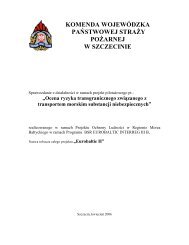Towards a Baltic Sea Region Strategy in Critical ... - Helsinki.fi
Towards a Baltic Sea Region Strategy in Critical ... - Helsinki.fi
Towards a Baltic Sea Region Strategy in Critical ... - Helsinki.fi
You also want an ePaper? Increase the reach of your titles
YUMPU automatically turns print PDFs into web optimized ePapers that Google loves.
CHAPTER I: INTRODUCTION<br />
perspective is usually miss<strong>in</strong>g <strong>in</strong> the INTERREG priority list<strong>in</strong>gs, drafted <strong>in</strong> the<br />
spirit of rather traditional spatial plann<strong>in</strong>g; an issue which should given attention<br />
by the Commission.<br />
Why would this regional multilateralism be important from the CIP<br />
perspective? As discussed above, most of the CI <strong>in</strong>terdependencies are regionally<br />
determ<strong>in</strong>ed <strong>in</strong> one way or another. The regional particularities and the complexity<br />
of the issues at stake make these <strong>in</strong>terdependencies such that it seems not possible<br />
to address them and coord<strong>in</strong>ate the relevant efforts only ‘<strong>in</strong> Brussels’ by the EPCIP<br />
structures. For <strong>in</strong>stance, the electricity supply of F<strong>in</strong>land is directly – and<br />
physically – connected to Sweden, Russia, and Estonia; oil transportation goes<br />
through the <strong>Baltic</strong> <strong>Sea</strong> and a major tanker catastrophe would affect several if not<br />
all the coastal countries; geographic proximity easily makes national health<br />
problems regional; or bank<strong>in</strong>g and f<strong>in</strong>anc<strong>in</strong>g related activities, as well as those<br />
related to ICT services, are <strong>in</strong> many times taken care by companies which operate<br />
<strong>in</strong> several BSR countries through the same web-based systems.<br />
One particular feature of BSR cooperation is that Russia, or a respective<br />
Russian adm<strong>in</strong>istrative level, is <strong>in</strong>volved as full-fledged partner and member <strong>in</strong><br />
many cases, like <strong>in</strong> the CBSS, AI, BEAC, BASREC, VASAB, BSSSC. EU-Russian<br />
cooperation does not always provide the necessary – detailed or concrete enough –<br />
multilateral framework for cross-border cooperation <strong>in</strong> the <strong>fi</strong>eld of CIP <strong>in</strong> the BSR.<br />
At the same time, many threats to the very central <strong>fi</strong>elds of CI, such as energy<br />
supply, nuclear safety, or transport, are necessarily connected to Russia.<br />
As discussed above, this regional cooperation is active but based on a very<br />
fragmented and complex network of actors. While it would be impossible to<br />
follow or monitor all of these multi-level simultaneous activities from Brussels,<br />
coord<strong>in</strong>ation is a real regional challenge as well. The challenge and the necessity<br />
of coord<strong>in</strong>ation aris<strong>in</strong>g from the organizational fragmentation has been a widely<br />
discussed theme already a longer time, as there seems to be a considerable<br />
overlaps both <strong>in</strong> terms of geographical area and memberships, as well as activities<br />
and issue areas.<br />
As such, no-one suggests the establishment of a hierarchic system. Thus,<br />
Mariussen et al. (2000), for <strong>in</strong>stance, have argued that there is a trend dur<strong>in</strong>g<br />
recent debates <strong>in</strong>dicat<strong>in</strong>g that the classic mode of hierarchical control between and<br />
with<strong>in</strong> <strong>in</strong>ternational organizations is loos<strong>in</strong>g ground, and that <strong>in</strong>formation flows<br />
and <strong>in</strong>centive systems, enabl<strong>in</strong>g autonomic operation of the different entities<br />
work<strong>in</strong>g <strong>in</strong> the same <strong>fi</strong>eld is preferred. Cooperation and coord<strong>in</strong>ation are<br />
emphasized ma<strong>in</strong>ly at the level of implementation. Though basically supportive<br />
towards this trend, Mariussen et al. list several problems aris<strong>in</strong>g from this scheme.<br />
1) Insuf<strong>fi</strong>cient learn<strong>in</strong>g may result from the fact that the same lessons may have to<br />
be learned over and over aga<strong>in</strong> by different agents; 2) Harmful competition and<br />
power struggles can lead to wasted resources and the loss of overall objectives; 3)<br />
Avoidance of responsibility can be caused without a clear division of tasks; 4)<br />
Opportunism, caused by the unclear structures, may <strong>in</strong>fluence the agents to go <strong>in</strong><br />
wrong directions; 5) Information overload is caused by the autonomous agents’<br />
efforts to coord<strong>in</strong>ate their activities at the grass-root level, result<strong>in</strong>g <strong>in</strong> too many<br />
meet<strong>in</strong>gs; 6) Wrong (<strong>in</strong>vestment) decisions can be made because of a lack of<br />
NORDREGIO REPORT 2007:5 51

















